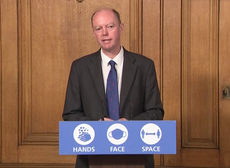Coronavirus: Local lockdowns will give hospitals ‘best possible chance over winter,’ says NHS chief
Chris Hopson, chief executive of NHS Providers, says ‘painful’ lockdown measures are necessary to reduce number of national cases and afford health services breathing space
Local lockdowns will help alleviate pressure on health services during the second coronavirus wave and give hospitals “the best possible chance over winter”, an NHS chief has said.
Millions of people are facing tougher restrictions after Boris Johnson announced a new Covid-19 alert system, dividing the whole of England into three tiers deemed at medium, high or very high risk.
The prime minister said immediate action was needed because data on rising infections were flashing “like dashboard warnings in a passenger jet”. A total of 13,972 new cases were reported on Monday, with 50 deaths across the UK.
The move came after government medical advisers warned that hospitals are now treating more patients for Covid-19 than when the first national lockdown was imposed in March, with infections increasing fourfold in the past three weeks and spreading into older and more vulnerable groups.
Chris Hopson, chief executive of NHS Providers, which represents all NHS trusts in England, said the “painful” lockdown measures were necessary to reduce the number of national cases and afford health services breathing space to continue treating non coronavirus-related problems.
"The fact that we are beginning now to mobilise the Nightingale centres is a clear indication of the pressure the NHS might come under which is why we have been arguing ... that it's really important we move quickly and decisively to tough local lockdowns wherever they are needed,” Mr Hopson told Good Morning Britain.
"Clearly the NHS has been under pressure and clearly we'd always like more staff, we'd always like more beds, and that's an issue which the government hopefully is going to address when it looks at the spending for the NHS over the next few years.”
He said NHS staff are “going to do everything they can” to provide treatment for those who need it, and called upon the public to “follow the advice about hands, face and space”.
Mr Hopson said it was “really important” that “we try and minimise the number of Covid cases coming in so that we can provide the cancer treatment, the heart attack treatment, all the other treatments that are needed.
"If we put those tough local lockdowns in place, however painful they may be, and we can reduce the number of Covid cases, we're giving the NHS the best possible chance over winter, which is when we are at our busiest... that gives us the best possible chance to treat all of those people who need treatment."
Despite recent remarks from Sir Simon Stevens, the head of NHS England, that hospitals should continue to provide normal care in the months ahead, NHS trusts across the north have already begun to prepare for the cancellation of non-urgent operations amid a rise in seriously ill Covid-19 patients.
Liverpool’s hospitals have started scaling back their elective activity and preparing non-specialist staff to be redeployed to critical care teams, according to a memo seen by the Health Service Journal.
Steve Warburton, the chief executive of Liverpool University Hospitals NHS trust, said that the city’s main acute hospitals had reached a “critical point”, adding that the trust was “taking a phased approach to reducing our elective programme, while exploring options with other providers to maintain some of this work in alternative locations”.
Three temporary Nightingale field hospitals at Manchester, Sunderland and Harrogate have also been told to mobilise in preparation for the emerging second wave, which could leave hospitals in the north overwhelmed in the coming weeks.
Dr Jane Eddleston, the medical lead for Greater Manchester, told the Downing Street briefing on Monday: “The north-west has about 40 per cent of all Covid cases at the moment and this is proving very challenging for us.
“The situation at the moment is that 30 per cent of our critical care beds are taken up with patients with Covid and this is starting to impact on the services we provide for other patients.”
On Sunday Dr Jonathan Van-Tam, England’s deputy chief medical officer, said: “If cases rise dramatically, the NHS will need to focus more on dealing with the life-threatening situations immediately in front of them; this can mean freeing up staff and space by postponing other non-urgent procedures and treatments.”



Join our commenting forum
Join thought-provoking conversations, follow other Independent readers and see their replies
Comments